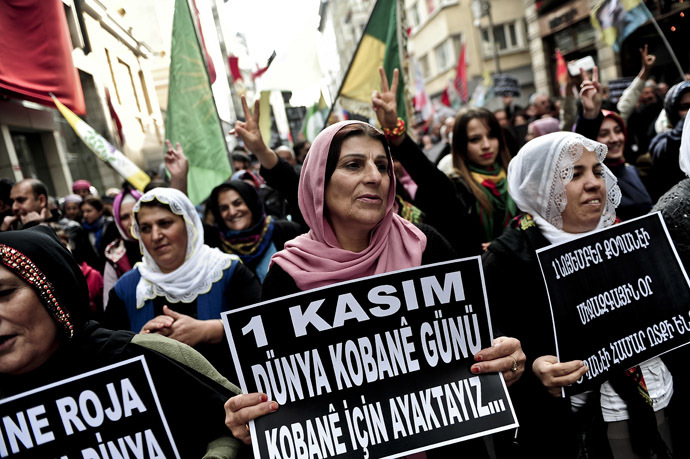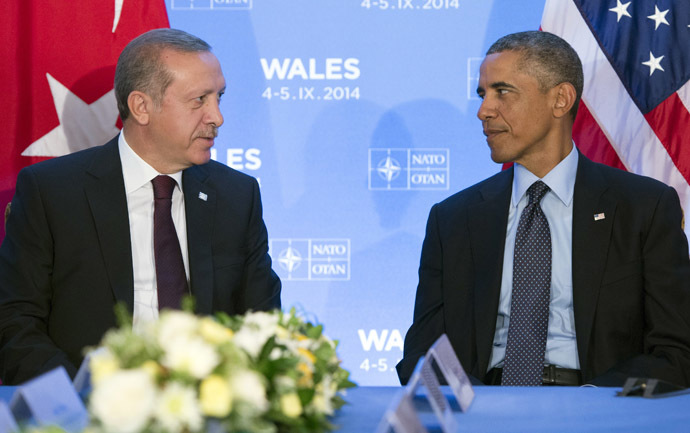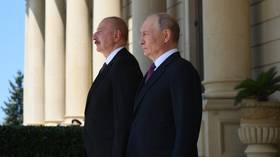‘Turkish government increasingly become more authoritarian’

There is anti-western sentiment in Turkey, but the majority of people would refrain from acts like the attack on US sailors. A much bigger problem is the growing authoritarianism of the government, Firat Demir from the University of Oklahoma, told RT.
RT:The US has condemned the attack on the American sailors by Turkish nationalists in Istanbul. Do you expect Washington to take any action?
Firat Demir: I don’t expect any action to be taken.The incident that happened today is by a small ultra-nationalistic youth organization and there were maybe 10-15 young people that did this attack and I do not expect this to represent any real action against the US presence in Turkey, which is a member of NATO, or any serious reaction from the US side or the Turkish side. The US embassy in Turkey condemned the attack. And I do not see that as a representative action by a significant majority of people in Turkey. This is a very small group of people, they are extremely nationalistic and they follow a very rigid version of Kemalist ideology.
In terms of opinions and views they are highly authoritarian, they are against any pluralistic view, or discussion, or debates on questions regarding Turkey, and they are quite paranoid about the intentions of the US in Turkey and its neighboring countries. For example, on the Kurdish issue the group takes a very radical view, and thinks that Turkey only belongs to Turks. This is not me saying it, this is if you look at their publications and writings, this is mostly represented by university students.
The total representation of the Kemalist party in Turkey is not more than 20 percent. And this is a fraction of that in terms of their views. They take a very radical view regarding what the US, they think, is planning in Iraq and Syria, and increasing Kurdish aspirations for independence in Syria and Iraq, and also in Turkey makes this group also more agitated. They think that there is a broader plan to separate and split Turkey into multiple parts and any possibility for Kurdish independence in Syria or Iraq they see as a threat to their national unity.
RT:What's behind the growth of anti-American sentiment in Turkey?
FD: You have to take into account that Turkey is a big country. More than a fifth of the country is represented by the Kurds who have no problem with Americans and they actually see an increasing US presence and intervention in Syria and Iraq against Islamic State or their support in Northern Iraq, Kurdistan region as possible steps. And they see the US as a possible ally in a future independent Kurdistan. Regarding the rest of Turkey there are also multiple parties. There is a Kemalist segment of the country. And nationalism is very strong in Turkey; it is starting from the kindergarten where they teach their nationalistic propaganda in history classes and the rest about what Turkey is, what Turkey belongs to. An average Turk doesn’t know much about its recent history during the final years of the Ottoman Empire, from the Armenian genocide to other issues.

In the last five or six years the government has increasingly become more authoritarian and closed the media to any possible debate or discussions about the issues that an average person faces. It might be from workers security to broader national issues from pluralism representation in politics to democracy. Our government is increasingly becoming more authoritarian which allows them to change the public opinion along any dimension they want. Having said that, there is a group of people in Turkey - I would say a significant minority - with a very negative view of the US and the western world. After all we are talking about a country in which the national anthem refers to the West as a monster who lives with a single tooth. So we cannot deny that, we cannot ignore that. But this does not lead to the conclusion that Turkey is increasingly becoming an anti-American nation or country. There is a general anti- western sentiment mostly because of the recent wars in Iraq and Syria, and about the increasingly vocal assertions of Europe and the US on Kurdish rights. As you know there is an ongoing peace process with the Kurds in Turkey which again represents more than a fifth of the country and until recently their language was illegal. Till the early 1990’s Kurdish was illegal, banned in Turkey.
Still many Turks think that there is no such thing as a Kurdish language or a Kurdish nation. Increasing rights given to Kurds and the Kurdish minority they see as an intervention in their national unity. Some of them are connecting this with the US or the rest of Europe and that makes the hostile. But xenophobia is not new in Turkey. After the collapse of the empire you have created a country where more than 90 percent are declared as Muslims even though less than hundred years ago it was different. More than a half of Istanbul [population] was non-Muslims at the turn of the last century. And from then they tried to create a nation state out of multiple dozens of different ethnic groups. And “Turkishness” became the bounding glue for this new nation state.
Greeks were sent out of the country through the population exchange with the Greek government, and Armenian genocide led to more than a million of Armenians to disappear from the country and there are only a few thousand in Istanbul. And Kurds are the only minority left that still asserts their own national identity rivaling the Turkish identity. That is why it is a complicated question, and I don’t assign much importance to the latest attack on the US soldiers, a small group of people. And I would say most of people would stay away from such violent acts in Turkey.

RT:Will this incident affect relations between Washington and Ankara?
FD: I don’t think so there are much more serious issues. Politics is a two-way street and both sides try to get as much as possible for their own side. And the ongoing civil war in Syria and ISIS advances in Iraq makes Turkey the only ally as a NATO member that the US can cooperate with. I don’t see [this latest incident] causing any problem. A more significant problem is the increasing authoritarianism of our own government.
An Obama administration and - after two years - a new US administration will have to find a way to deal with this increasing authoritarian semi-democratic country. There are real hopes that Turkey was moving in the right direction just four to five years ago. But since the 2009 national referendum the country moved further to authoritarianism.Erdogan is like a single man, he wants to reassert himself as the new Ataturk of the country. This is the bigger issue. But meanwhile probably the debates on the future of Syria and Iraq will dominate the discussions between Washington and Ankara.
RT:Should Americans living in Turkey be concerned by this - do they face a significant security threat?
FD: The average public in Turkey know what the government policy is versus what individual Americans do or don’t. You may disagree with the policies of your government but that doesn’t lead you to the conclusion that each member of that country or citizen of that country represents that public policy. Many people had different opinions on Washington regarding the Iraqi invasion, both Gulf wars, and recent developments in Iraq and Syria. Nevertheless this did not lead to any reaction towards Americans. There are thousands of American students studying in Turkey and working in Istanbul and Ankara apart from the fact that there are thousands of American soldiers serving as part of NATO in Turkey.
The statements, views and opinions expressed in this column are solely those of the author and do not necessarily represent those of RT.
The statements, views and opinions expressed in this column are solely those of the author and do not necessarily represent those of RT.












